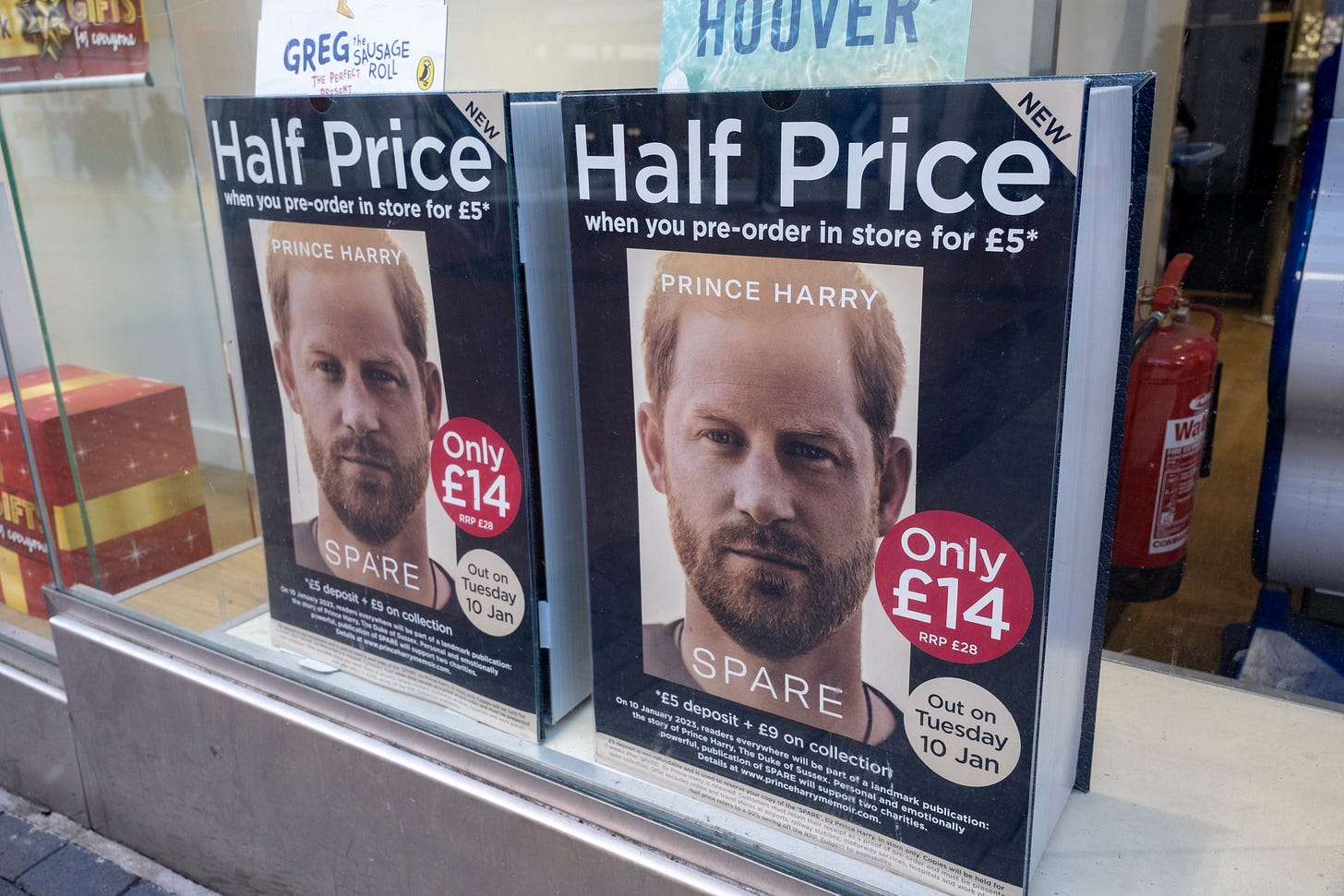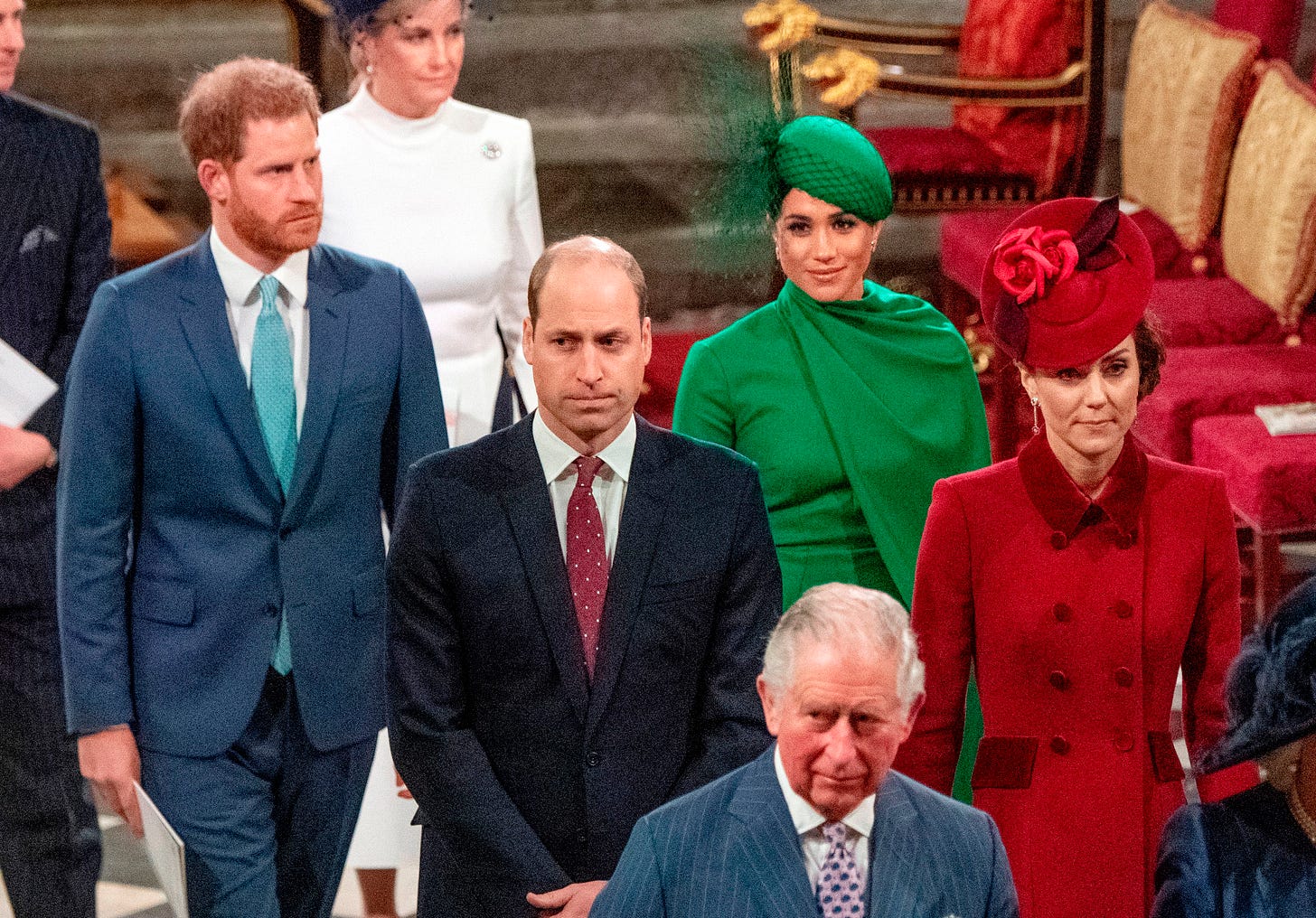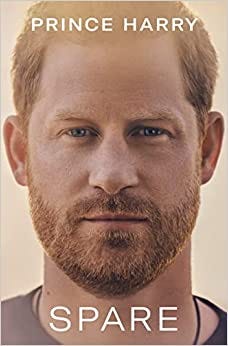How Risky is Publishing's $20M Gamble on Prince Harry's Memoir?
We count the spare change in 'Spare' to see what it'll take to turn a profit as Penguin Random House gambles on a Sussex multiverse

Happy New Year! And thanks for reading The Optionist. Since today’s my birthday (which I share with Florence Pugh, Danica McKellar, Mel Gibson and the Queen of the epic Twitter burn, Greta Thunberg), I decided to extend our 30 percent off a paid subscription New Year’s sale until midnight tonight. It’s time to put finding great IP at the top of your resolutions list!
I’ve got some great stuff lined up for the newsletter in 2023, including a conversation with a couple of IP and copyright legal eagles coming soon — if you’ve got questions about IP law that you’ve always been curious about, send them my way.
Meanwhile, the big publishing event of 2023 drops next week. Prince Harry’s headline-generating memoir publishes on January 10. Since there has been much discussion around the eye-watering number on the overall deal — a $20 million package — I thought it would be worth doing some rough calculations on what it will take for Penguin Random House to turn a profit. I’m always fascinated by the economics behind deals like this. It’s also an interesting exercise because it spotlights the ways in which publishing resembles the movie business with big bets and big returns on tentpole releases. (Don’t feel bad if the math makes your eyes glaze over. I get it. Skip past “The Economics” section and head right to “The Takeaway” if you just want the bottom line.)
The Book
On the heels of the hotly-debated Netflix documentary Harry & Meghan, the next big thing on the British royal drama calendar is Spare, dropping only months after King Charles’ ascension. The $20 million advance from Penguin Random House is reported to be for this book and possibly three others, though as with so much about the deal, the publisher hasn’t offered many details beyond announcing Spare.
Whatever Harry got from PRH, it’s on top of a reported $30 million from Spotify and a $100 million from Netflix for the couple. PRH hasn’t been totally clear if the deal will include a Meghan Markle book, though the Daily Mail is now reporting that a memoir from her could be the fourth book in the deal. Harry said he’s giving the proceeds from the book to charity, but all that’s been revealed so far is a $1.5 million donation to Sentebale, a charity he founded to help kids in Lesotho and Botswana with HIV/AIDS, and another £300,000 to U.K.-based WellChild.
Confirmed details on the book’s contents have been scarce beyond what was in the original announcement in which Harry stated he was “writing this not as the prince I was born but as the man I have become.” Topics include his service in Afghanistan, his marriage, fatherhood, and of course, his relationships with his father, brother, Prince William, and grandmother, the late Queen Elizabeth. PRH describes it as a story of “raw, unflinching honesty… full of insight, revelation, self-examination, and hard-won wisdom.”

It will be interesting to see how much appetite the public still has for Harry and Meghan. They’ve delivered strong ratings so far. Their March 2021 primetime sit down with Oprah drew 17 million viewers in the U.S. — the second largest non-sports audience of the TV season (trailing only the post-Super Bowl episode of The Equalizer) — and an amazing 11.3 million viewers in the much smaller U.K. Streaming ratings are harder to quantify, but by all estimates, Harry & Meghan is a huge hit for Netflix, drawing some 28 million viewers in the first week, making it the best doc debut in the streamer’s history. Still, reviews and viewer reaction were just so-so, with the series scoring just a 38 percent fresh from critics and 18 percent from viewers on Rotten Tomatoes. Undoubtedly, there will be concerns about overexposure and public fatigue, since all Harry really has to offer is his family feud and marriage — and this will be the third big go-around for the story. But early indications are positive — as of Jan. 3, Spare is the No. 2 bestselling book on Amazon not just in the U.S., but also the U.K., Canada and Australia.
When PRH announced the deal, it targeted a late 2022 release, but the Queen’s September death (and possibly Harry’s continual revisions thereafter) pushed the release into early 2023. The book is being co-written with novelist and journalist J.R. Moehringer, who ghosted memoirs for Andre Agassi and Phil Knight, but might be better-known in Hollywood for the adaptations of his own memoir, The Tender Bar, and the LA Times article that became the 2007 Samuel L. Jackson vehicle Resurrecting the Champ.
The Economics
So Harry got $20 million in advance for four books. We don't know exactly how that money is divided up. I would guess that the value of the deal is front-loaded in the first book. The biggest thing Harry's got to offer is an inside look at his life. Whatever the next books are about — possibly one on leadership and philanthropy, possibly one on wellness — none of it is going to be as compelling as stuff about the death of his mother, what the Queen was really like, who in the royal family speculated about what shade of brown his children would be, etc. If the first book doesn't sell well, those next three aren't worth anything, so PRH needs to recoup a lot of its advance on this first book to make a profit on the whole deal so these calculations are based on what it might take to cover the whole advance on just the first book.
PRH won worldwide rights to the book (interestingly it has never been revealed exactly who handled the deal for Harry) and it is publishing it in 16 languages (English, German, Spanish, distinct Portuguese versions for Portugal and Brazil, Chinese, Danish, Dutch, Finnish, French, Greek, Hungarian, Italian, Polish, Romanian and Swedish. The literal translations of the foreign titles, per the Daily Mail: Spanish is In the Shadow, French is The Substitute, Italian is The Minor, in Polish it’s The Other One). The foreign language editions are important but the success of the book — and the ability of PRH to turn a profit — hinges on how well the book sells in the English-speaking countries — the U.S., U.K., Canada and Australia.
Let's dive into the numbers now. The sticker price for Spare is $36 (though retailers can charge what they want) and generally the wholesale price is half that, so PRH nets $18 for each print book. The price for the e-book is $17.99 and PRH gets 70 percent of that (the other 30 percent is the app store charge for Amazon, Apple, Barnes & Noble, etc.), so they net $12.60 for each ebook. As a general rule, authors get a 15 percent royalty on print sales and 25 percent on ebooks (calculated on the sticker price so Harry gets about a $5.40 royalty on print, $4.50 on ebooks).
Now we don't know how many copies of Spare Harry will move, but some facts:
In 2021 the bestselling print book in the U.S. was…
Dog Man #10: Mothering Heights by Dav Pilkey, which sold 1.3 million copies.
The 25th bestselling book, The Judge's List by John Grisham, sold 517k copies.
In 2020…
Barack Obama’s A Promised Land topped the list with 2.5 million copies sold.
Six other books topped 1 million sales (versus just two total in 2021): Stephenie Meyer's Midnight Sun; Dav Pilkey's Dog Man, Mary Trump's Too Much and Never Enough, Suzanne Collins's The Ballad of Songbirds and Snakes, Delia Owens’, Where the Crawdads Sing and Glennon Doyle's Untamed.
But number 25, Erik Larson's The Splendid and the Vile, moved about as many copies as Grisham.
Let's say Spare sells 750,000 copies, making it somewhere between the 5th and 12th bestselling book of the year. Add to that another 375,000 ebooks — the list was just print books but 2:1 could work as a rough guide for estimating Spare’s ebook sales — for a total of 1.125 million copies sold.
On those sales, PRH would generate about $18.2 million in revenue and pay out an estimated $5.6 million in royalties. Printing and warehousing costs could be as much as $6 a book considering recent inflation (let’s assume a first print run of 1 million copies). Plus, ghostwriter Moehringer gets a fee (reportedly $1 million). Even though Harry will have earned out a bit more than 25 percent of his $20 million advance, PRH will have recouped $11.2 million, more than half of its investment in gross revenue after expenses ($5.6 million) plus Harry’s $5.6 million in royalties (remember, the first $20 million in royalties goes to paying back the advance so PRH keeps that money). It’s easy to see how much faster a publisher can recoup its cost than it takes for an author to earn out an advance. Of course that doesn't include PRH’s overhead costs for salaries, office space, etc., which are hard to apportion to an individual book.
Now, if sales went up to a million print copies with an equal rise in digital sales then PRH would gross about $14.3 million after deducting Moehringer’s fee and the cost of printing 1.5 million copies, meaning the company would cover nearly three-quarters of its investment on the first book. Harry’s royalties would total about $7.6 million. Even if sales were only 500k print and 250k digital, PRH would gross about $7.2 million in the U.S. after paying for printing and ghostwriting.
But even that number isn't as “bad” as it sounds.
We haven't added sales from other countries to our calculations. Right off the bat, U.K. sales would close the gap. In Britain, the bestselling book might move 750k-800k copies, and the 10th bestseller, around 200-225k copies. Whatever the book sells in the U.S., it is likely to be at least as popular in the U.K., so Harry could easily sell another 300k-500k books there.
Sales in Canada and Australia should add in another few hundred thousand copies. (A spot check of pre-sales in both countries suggest that Canadian interest is on par with the U.S.; Australia lags a bit.)
Taken together with the other foreign editions, total print sales outside the U.S. should approach parity with those here.
The Takeaway
All this is a way of saying, the economics of the deal aren't bad for PRH so long as the book isn't a total Arnold Schwarzenegger-like bomb (his memoir moved 21k copies in the first week and just 6k in the second, even with a massive PR push). Indeed, I would go so far as to say, this was a shrewd acquisition for PRH that seems likely to be profitable for the company. If you're keeping score at home, I figure that PRH can recoup its total investment in the four-book deal with Spare with this calculation:
It would need to sell more than 1.3 million print copies and 400k digital editions around the world. A total of 1.7. million units.
I believe it can achieve that this way:
Spare becomes just a modest hit in the U.S., say the 14th or 15th bestselling book of the year, with about 650k print sales (and another 200k ebooks.
Add in an equal amount of foreign sales.
Harry will appear far short of earning out his $20 million advance, BUT, the house always wins: that would make the next three books, if they happen, gravy for PRH.
It’s also interesting to see the ways in which publishing resembles the movie business. Both are dependent on the profits from blockbusters to float the whole enterprise. The gambles are large, but the profits from a big hit far outstrip the losses on a miss, which is what encourages executives to take these risks. Both operate with essentially two sets of a books — one that tracks if the company is making a profit, one that tracks bonuses for participants (though to be fair, publishing is way more transparent than Hollywood).
What Else I’m Reading
Podcasting, meet streaming. Streaming, meet podcasting. You two have a lot to talk about: “After years of steady, double-digit percentage growth for podcasting, listenership is starting to slow,” observes Insider Intelligence. But they see lots of opportunity in international markets (and note that iHeartRadio is playing in the metaverse now to attract younger listeners. Let’s see how that goes).
Richard Rushfield’s end-of-year anonymous exit interviews over at The Ankler are completely absorbing. I particularly found the ones with a producer, an agent and a writer illuminating. I’ll be following up on several things I learned from them about how the IP business is evolving.
My New Year’s resolution is to get on BookTok — even librarians are hopping on the trend. Not sure what it is? This Slate piece will help get you started.
The media has been looking for the next Oprah’s Book Club for more since Oprah cancelled her show (can you believe it has been more than a decade?). The current contender is one led by Jenna Bush Hager, the subject of sunny profiles in both the LAT (which got there first) and the NYT.
Netflix’s Christmas movie king talks about how he got there. If nothing else, this piece is worth it just for the quote in the headline: “Does anyone here have the number one Netflix movie in the world? I do.”
See you back here on Thursday with my first-of-the-year IP picks ready for option, for paid subscribers only.






